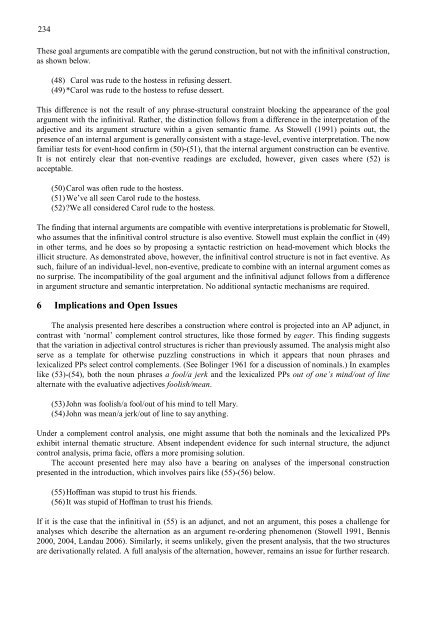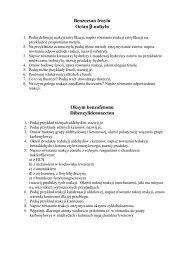Evaluative Adjectives: An Adjunct Control Analysis
Evaluative Adjectives: An Adjunct Control Analysis
Evaluative Adjectives: An Adjunct Control Analysis
Create successful ePaper yourself
Turn your PDF publications into a flip-book with our unique Google optimized e-Paper software.
234<br />
These goal arguments are compatible with the gerund construction, but not with the infinitival construction,<br />
as shown below.<br />
(48) Carol was rude to the hostess in refusing dessert.<br />
(49) *Carol was rude to the hostess to refuse dessert.<br />
This difference is not the result of any phrase-structural constraint blocking the appearance of the goal<br />
argument with the infinitival. Rather, the distinction follows from a difference in the interpretation of the<br />
adjective and its argument structure within a given semantic frame. As Stowell (1991) points out, the<br />
presence of an internal argument is generally consistent with a stage-level, eventive interpretation. The now<br />
familiar tests for event-hood confirm in (50)-(51), that the internal argument construction can be eventive.<br />
It is not entirely clear that non-eventive readings are excluded, however, given cases where (52) is<br />
acceptable.<br />
(50) Carol was often rude to the hostess.<br />
(51) We’ve all seen Carol rude to the hostess.<br />
(52) ?We all considered Carol rude to the hostess.<br />
The finding that internal arguments are compatible with eventive interpretations is problematic for Stowell,<br />
who assumes that the infinitival control structure is also eventive. Stowell must explain the conflict in (49)<br />
in other terms, and he does so by proposing a syntactic restriction on head-movement which blocks the<br />
illicit structure. As demonstrated above, however, the infinitival control structure is not in fact eventive. As<br />
such, failure of an individual-level, non-eventive, predicate to combine with an internal argument comes as<br />
no surprise. The incompatibility of the goal argument and the infinitival adjunct follows from a difference<br />
in argument structure and semantic interpretation. No additional syntactic mechanisms are required.<br />
6 Implications and Open Issues<br />
The analysis presented here describes a construction where control is projected into an AP adjunct, in<br />
contrast with ‘normal’ complement control structures, like those formed by eager. This finding suggests<br />
that the variation in adjectival control structures is richer than previously assumed. The analysis might also<br />
serve as a template for otherwise puzzling constructions in which it appears that noun phrases and<br />
lexicalized PPs select control complements. (See Bolinger 1961 for a discussion of nominals.) In examples<br />
like (53)-(54), both the noun phrases a fool/a jerk and the lexicalized PPs out of one’s mind/out of line<br />
alternate with the evaluative adjectives foolish/mean.<br />
(53) John was foolish/a fool/out of his mind to tell Mary.<br />
(54) John was mean/a jerk/out of line to say anything.<br />
Under a complement control analysis, one might assume that both the nominals and the lexicalized PPs<br />
exhibit internal thematic structure. Absent independent evidence for such internal structure, the adjunct<br />
control analysis, prima facie, offers a more promising solution.<br />
The account presented here may also have a bearing on analyses of the impersonal construction<br />
presented in the introduction, which involves pairs like (55)-(56) below.<br />
(55) Hoffman was stupid to trust his friends.<br />
(56) It was stupid of Hoffman to trust his friends.<br />
If it is the case that the infinitival in (55) is an adjunct, and not an argument, this poses a challenge for<br />
analyses which describe the alternation as an argument re-ordering phenomenon (Stowell 1991, Bennis<br />
2000, 2004, Landau 2006). Similarly, it seems unlikely, given the present analysis, that the two structures<br />
are derivationally related. A full analysis of the alternation, however, remains an issue for further research.



